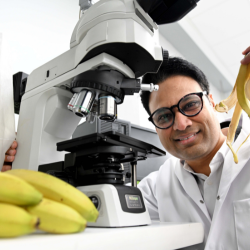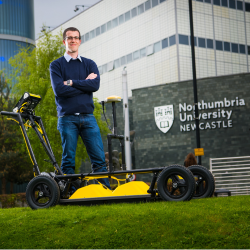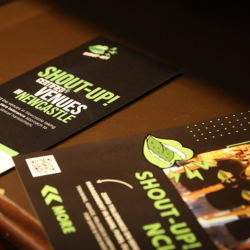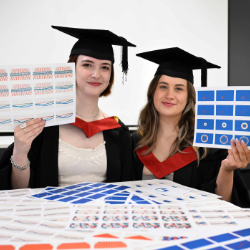-
Study
-
UCAS Clearing 2024
- Clearing Courses
- The Clearing Process
- UCAS Tariff Points
- Clearing 2024 FAQs
- Confirmation
- Clearing Virtual Event
-
Undergraduate
- Search for a Course
- Undergraduate Open Day & Events
- Application Guides
- Northumbria University UCAS Exhibitions
- Foundation Years
- Undergraduate Fees & Funding
- School & College Outreach
- Continuing Professional Development
-
Postgraduate
- Postgraduate Study Degree
- Postgraduate Research Degrees
- Postgraduate Open Days and Events
- Postgraduate Fees & Funding
- Flexible Learning
- Thinking about a Masters?
- Continuing Professional Development
- Change Direction
-
Student Life
- The Hub - Student Blog
- Accommodation
- Life in Newcastle
- Support for Students
- Careers
- Information for Parents
- Students' Union
- Northumbria Sport
-
-
International
International
Northumbria’s global footprint touches every continent across the world, through our global partnerships across 17 institutions in 10 countries, to our 277,000 strong alumni community and 150 recruitment partners – we prepare our students for the challenges of tomorrow. Discover more about how to join Northumbria’s global family or our partnerships.
View our Global Footprint-
Applying to Northumbria
- European Union
- Our London Campus
- Northumbria Pathway
- International Events
- Entry Requirements and Country Representatives
- Regional Offices
-
Northumbria Language Centre
- Faculty Requirements
- Acceptable English Requirements
- Pre-Sessional English and Study Skills
- Academic Language Skills Programmes (ALS)
-
International Fees, Funding & Scholarships
- International Undergraduate Fees
- International Undergraduate Funding
- International Masters Fees
- International Masters Funding
- International Postgraduate Research Fees
- International Postgraduate Research Funding
- International Money Matters
-
Life at Northumbria
- International student support
- Careers
-
International Mobility
- Current Northumbria Students
- Incoming Exchange Students
-
-
Business
Business
The world is changing faster than ever before. The future is there to be won by organisations who find ways to turn today's possibilities into tomorrows competitive edge. In a connected world, collaboration can be the key to success.
More on our Business Services -
Research
Research
Northumbria is a research-rich, business-focused, professional university with a global reputation for academic quality. We conduct ground-breaking research that is responsive to the science & technology, health & well being, economic and social and arts & cultural needs for the communities
Discover more about our Research -
About Us
-
About Northumbria
- Our Strategy
- Our Staff
- Place and Partnerships
- Student Profiles
- Alumni Profiles
- Leadership & Governance
- Academic Departments
- University Services
- History of Northumbria
- Contact us
- Online Shop
-
-
Alumni
Alumni
Northumbria University is renowned for the calibre of its business-ready graduates. Our alumni network has over 237,000 graduates based in 178 countries worldwide in a range of sectors, our alumni are making a real impact on the world.
Our Alumni - Work For Us
What will I learn on this module?
The aim of the module is to enable you to further develop the practical and theoretical skills you learned in previous modules. You will be introduced to advanced kinematic and kinetic data collection and analysis techniques, and to potential applications relevant to current research initiatives in sport and clinical biomechanics. In the second part of the module, you will explore advanced techniques used in clinical biomechanics. You will develop your practical skills and learn to use clinical normative profiling techniques. You will design your own projects and learn to independently collect, and critically appraise your data, and report your findings. In addition, this module aims to develop your appreciation of scientific rigor in experimental design and testing, and to give you an understanding of how to control and measure potential sources of error, reliability and validity.
How will I learn on this module?
This module will facilitate your learning through formal, but interactive, lectures which provide the main theoretical and conceptual information. These taught sessions will be supported by structured small-group interactive practical laboratory workshops with a strong applied emphasis, seminars, and discussions. The concepts of data stability, validity, and reliability are embedded throughout this module, and you will take part in laboratory workshops that will provide you with the opportunity to discuss potential errors arising from the data collection process, and to design methods of assessing data stability and random and systematic error. In seminars you will be given the opportunity to develop your skills in critically evaluating the data collection and analysis employed in existing research articles. You will also have seminars that are designed to assist you in writing a grant from costing, dissemination and structure. You will design and undertake clinical and biomechanical assessments of healthy individuals and those with disabilities or chronic injury. You will compare your findings to normative data, current literature, and underpinning theory, and synthesize and communicate your findings. Preparation for the assignment will involve you in designing your own data collection, and analysis, sessions to appraise the reliability and accuracy of data collection systems. You will undertake reliability laboratory sessions whereby you will collect data which you will analyse for your grant application on a piece of biomechanical equipment such as force plates.
How will I be supported academically on this module?
Module information, assessment requirements and expectations, and important module announcements will be made through the eLP. Material to support your learning will be uploaded in advance of sessions. You will be provided with content verbally and guided through tasks during timetabled sessions. A dedicated assessment session will afford you the opportunity to ask assessment related questions in class. The Module Leader is there to support you with any queries that you may have about the module content, and all staff members provide tutorial time outside of class time. Module tutors will provide you with the necessary information on how to arrange a tutorial. You will have the opportunity to receive formative feedback on your development during the module, and you will receive feedback on summative work to help you identify areas of strength and areas for development. There will be the opportunity to discuss your feedback with a member of staff during a tutorial. There is also further academic skills support available from the University Library services. If this module is in option pot two for your programme, you will receive advice and guidance at a module options event to help you make an informed decision about how it fits with your own academic and professional development. Online pre-learning material will be made available to help you prepare for the module.
What will I be expected to read on this module?
All modules at Northumbria include a range of reading materials that students are expected to engage with. The reading list for this module can be found at: http://readinglists.northumbria.ac.uk
(Reading List service online guide for academic staff this containing contact details for the Reading List team – http://library.northumbria.ac.uk/readinglists)
What will I be expected to achieve?
On successful completion of the module, you will be able to:
Knowledge & Understanding:
1. Critically evaluate and apply a range of evidence-based assessment and intervention strategies in biomechanics.
2. Adopt a multi-disciplinary approach to solving complex problems.
Intellectual / Professional skills & abilities:
3. Work independently to undertake a project to critically appraise, and functionally utilise, generic kinematic and kinetic data collection methods, and different IT formats.
4. Demonstrate a critical appreciation of scientific rigor in the processes of experimental design, data collection, analysis, interpretation and presentation.
Personal Values Attributes (Global / Cultural awareness, Ethics, Curiosity) (PVA):
5. Demonstrate an understanding of the need for an ethical and sensitive approach when working with different client groups.
How will I be assessed?
You will undertake one assessment in this module, at the end of semester two.
1) Individual grant application (2500 words, 100%, all MLOs, KU 1,2; IPSA 3,4; PVA 5). You will be required to write a grant application applying for funds to support a proposed research study on a topic of your choice, which requires data collection in either sports, exercise, or clinical biomechanics. A successful application will require you to conduct an in-depth series of appropriate validity studies and pilot testing, and then undertake a critical evaluation of the magnitude of the potential errors and validity of the proposed method of data collection and methods of analysis.
Formative preparation for the validity study will take place in student led seminars where you will be able to practice your skills in critiquing journal articles and will receive feedback from your peers and tutors.
Preparation for the individual assignment will take place in specific focused workshops where you will be able to practice using relevant equipment and assessment skills and selecting key performance indicators.
Dedicated assessment sessions will be scheduled into the module to afford you the opportunity to ask assignment related questions.
Summative Feedback
You will receive written or audio feedback on your summative assessment to help you identify areas of strength and areas for development. There will be the opportunity to discuss your feedback with a member of staff during a tutorial.
Pre-requisite(s)
N/A
Co-requisite(s)
N/A
Module abstract
In this module you will be introduced to advanced kinematic and kinetic data collection and analysis techniques, and to potential applications relevant to current research initiatives in sport and clinical biomechanics. You will explore advanced techniques used in current biomechanical clinical assessment and evaluate both healthy individuals and individuals from clinical/chronic minorities. This module aims to develop your appreciation of scientific rigour in experimental design and testing, and to give you an understanding of how to control and measure potential sources of error, reliability and validity. You will design your own project and learn to independently collect, and critically appraise your data, and report your findings. You will be challenged to demonstrate your passion and creativity and to further develop your understanding of testing and measuring through writing a grant application to support a research a topic of your choice in either a sporting or clinical population
Course info
UCAS Code CB65
Credits 20
Level of Study Undergraduate
Mode of Study 3 years Full Time or 4 years with a placement (sandwich)/study abroad
Department Sport, Exercise and Rehabilitation
Location City Campus, Northumbria University
City Newcastle
Start September 2024 or September 2025
All information is accurate at the time of sharing.
Full time Courses are primarily delivered via on-campus face to face learning but could include elements of online learning. Most courses run as planned and as promoted on our website and via our marketing materials, but if there are any substantial changes (as determined by the Competition and Markets Authority) to a course or there is the potential that course may be withdrawn, we will notify all affected applicants as soon as possible with advice and guidance regarding their options. It is also important to be aware that optional modules listed on course pages may be subject to change depending on uptake numbers each year.
Contact time is subject to increase or decrease in line with possible restrictions imposed by the government or the University in the interest of maintaining the health and safety and wellbeing of students, staff, and visitors if this is deemed necessary in future.
Useful Links
Find out about our distinctive approach at
www.northumbria.ac.uk/exp
Admissions Terms and Conditions
northumbria.ac.uk/terms
Fees and Funding
northumbria.ac.uk/fees
Admissions Policy
northumbria.ac.uk/adpolicy
Admissions Complaints Policy
northumbria.ac.uk/complaints














